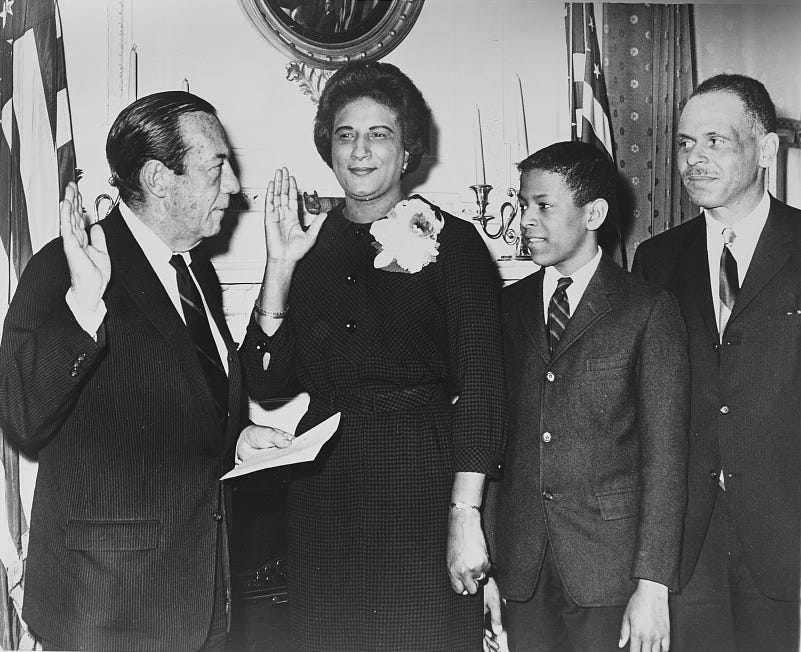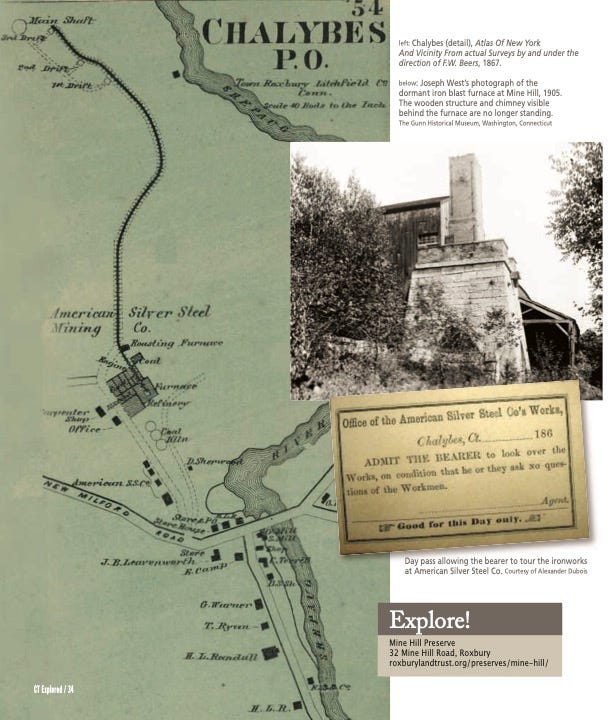CTExplored/Inbox
A Village Lost; A Village Found
Welcome to the latest issue of CTExplored/Inbox, your bi-weekly newsletter from Connecticut Explored with the latest stories, the newest Grating the Nutmeg podcast, programs and exhibitions from our partners to see/watch this month, and more!
Share it with friends and encourage them to sign up (it’s free)! (We hope you love it, but you always have the option to unsubscribe at the bottom of the e-mail.)
Summer 2021: City, Village, Neighborhood — Home
This issue, we’re celebrating those places we live in and love with stories from Norwalk to Norwich and Chester to (the lost village of) Chalybes.
Mine Hill & the Lost Village of Chalybes
Litchfield Historical Society’s Alex Dubois brings us the story of the lost village of Chalybes—now part of the Mine Hill Preserve operated by the Roxbury Land Trust.
What visitors see today, Dubois notes, “documents a brief but intense period of iron and steel production in Roxbury. The hill was mined as early as 1751. ... Soon after, brothers Abraham and Israel Brownson organized the site’s first large-scale mining operation.” A decade later, a young Ethan Allen invested in the operation, but, “these early ventures all targeted silver or lead deposits, not the considerable veins of siderite (iron carbonate) found there; as a result, none met with much success.”
The brief hey day came after the discovery that the real potential was in that siderite. After the Shepaug Spathic Iron and Steel Company began iron smelting and steel production in 1865, the village of Chalybes sprung up—named for, Dubois notes, “an ancient tribe known in mythology for its use of iron. … The village supported a post office, general store, school, lumber yard, coal yard, creamery, hat manufactory, cigar factory, hotel, and several boarding houses. Albert L. Hodge, manager of the iron mine, kept a well-patronized saloon and a dry goods store.”
Read the full story with a CTExplored Inbox/Premium subscription, which gets you access to all stories in every issue for just $30 a year:
Or, subscribe to the print magazine at CTExplored/SHOP for $30 a year which includes access to the full issue on our website. Or try us out with our First One Free offer.
Civil Rights Pioneer Adopts Chester

Chester Historical Society trustee and curator Marta Daniels writes about pioneering Civil Rights lawyer Constance Baker Motley and how she came to adopt Chester as her second home. “In 1965 Motley and her husband purchased a 10-room colonial built in 1745 on eight acres on Cedar Lake Road and became part of the community,” Daniels writes. Born in New Haven, Daniel continues, “it is not known why Motley chose Chester, but she had a connection to the town through wealthy New Haven building contractor and philanthropist Clarence Blakeslee, who, in 1939, financed Motley’s college education and then her law school degree. In 1920 Blakeslee had funded Chester’s YMCA Camp Hazen, one of the nation’s earliest integrated Ys.”
Daniels interviewed the late Barbara Delaney of Chester, who “fondly recall[ed] Motley’s lively dinner parties, for which she liked to cook, using vegetables from her large garden, now part of the preserve. … Motley’s Chester home became a family holiday spot, a destination for civil rights workers, and ‘Chester Chambers’ where her New York law clerks sometimes ‘adjourned.’”
In 2019 the State Historic Preservation Office designated the site as the Connecticut Freedom Trail’s 140th site.
Read the full story with a CTExplored Inbox/Premium subscription, which gets you access to all stories in every issue for just $30 a year:
Or, subscribe to the print magazine at CTExplored/SHOP for $30 a year which includes access to the full issue on our website.
Or try us out with our First One Free offer.
Norwalk’s Village Creek
And last but not least, Connecticut Historical Society’s Natalie Belanger brings us the story of a unique community in Norwalk that, as Belanger writes, “has been doing the work of seeking racial equity since 1949.” The neighborhood was founded as a cooperative “by five couples who wanted to live by the water and have an easy commute to New York City.” But they also wanted “above all else,” as the Village Creek prospectus documents, “a different type of community with a completely democratic character—no discrimination because of race, color, creed or politics.”
Based on the records of the Village Creek Homeowners Association, archived at CHS, Belanger reveals the ups and downs of maintaining a racial balance in this special Norwalk neighborhood.
Read the full story with a CTExplored Inbox/Premium subscription, which gets you access to all stories in every issue for just $30 a year:
Or, subscribe to the print magazine at CTExplored/SHOP for $30 a year which includes access to the full issue on our website.
Or try us out with our First One Free offer.
The Latest from Grating the Nutmeg
122. The New Connecticut Yankee
In this episode State Historian Walt Woodward visits Frank and Lisa Catalano who, in their 18th-century home garden in Lebanon, are using some very inventive approaches to bring back an old Connecticut tradition – self-sufficient food production. It's a history show for garden geeks . . . or maybe a garden show for history geeks.
Programs and Exhibitions to Enjoy This Month
A Perfect Day in Wilton
Enjoy a perfect summer day at the Wilton Historical Society. Visit an exhibition about legendary jazz musician Dave Brubeck, an outdoor farmers’ market, and a fragrant herb garden! The weekly outdoor farmers’ market is held Wednesdays, noon to 5 p.m., on the society’s grounds through October 27. Local artisans also sell their wares; enjoy a meal from gourmet food trucks on site. The society’s colonial herb garden at the c. 1740 Betts House is another summer treat.
Wilton Historical Society, wiltonhistorical.org
Welcome New State Librarian
Deborah Schander has been appointed the 11th State Librarian at the Connecticut State Library. Schander was the executive director of the Peter W. Rodino, Jr. Law Library Center for Information & Technology and associate professor of law at the Seton Hall Law School. Schander holds a J.D. and an M.L.I.S. from Florida State University (2007) and a B.A. in English from Washington Adventist University in Maryland.
Connecticut State Library, Ctstatelibrary.org
Reflection and Renewal in Old Lyme
Through September 19 the Florence Griswold Museum presents Social & Solitary: Reflections on Art, Isolation, and Renewal, an exhibition of historic and contemporary works from the museum’s collection that reflects on what our world has faced over the past year. The museum hopes visitors will use the exhibition, its gardens and grounds on the Lieutenant River, and a new outdoor installation by contemporary artist jackie sumell as a place to heal from all we’ve endured—to share, when possible, with friends and family, or simply to enjoy art and nature on their own.
Florence Griswold Museum, florencegriswoldmuseum.org
Subscribe to Connecticut History Review
Membership in the Association for the Study of Connecticut History (ASCH) includes a subscription to the Connecticut History Review, published twice annually. The Review is the only academic, peer-reviewed journal dedicated to the history of Connecticut. For more information visit asch-cthistory.org.
Editors’ Picks
Stories we love from back issues to read now.
“The Kent Iron Furnace,” Fall 2006
“UConn Law: The Trailblazing Bessye Bennett,” Spring 2014
“Site Lines: Connecticut’s Freedom Trail,” Winter 2012-2013
“How Segregation Happened in West Hartford,” Summer 2019
Ready to subscribe to CTExplored/Inbox PREMIUM for the full story and all access?
Give a gift subscription!
Thanks for subscribing to CTExplored/Inbox. This post is public, so feel free to share it.



